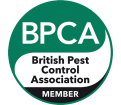
Call 0333 567 2020 for advice and quotes or contact us online
How To Get Rid Of Seagulls
Exclusion is the best seagull control solution to prevent gulls nesting or creating problems. There are, however, some gull control or deterrent solutions including gull spiking, gull netting, bird wire, an electric bird deterrent system, bird gel, falconry response, kites or audio deterrents.
It may also be possible to complete an egg and nest removal programme but, as with all seagull control methods, timing is crucial for effective and legal control.
Why are seagulls a protected species?
All birds are protected by the Wildlife & Countryside Act 1981. The control of birds in the UK is permitted but is governed by the UK ‘General Licences’. There are four versions – one each for England, Wales, Scotland and Northern Ireland as terms vary.
Management of any birds under the licences can only be completed where the species is causing conflict with conservation or public safety.
How to deter seagulls?
We do not recommend that you attempt to clear a gull’s nest by yourself. You may injure yourself or be attacked by angry seagulls and if you remove a nest of a different species by accident, you may face prosecution.
There are deterrent solutions that can be implemented depending on the time of year. The most effective measures are implemented before the seagull breeding season commences in March each year. If seagull control measures are not permanent (gull proofing) then the deterrent programme will need to be repeated each year. Gulls will return to a successful breeding site year after year and also young gulls will return to the site at which they were reared to feed, roost and after 3 years breed themselves.
When is the seagull breeding season?
The seagull breeding season is generally from March to September. Urban seagulls can be a particular nuisance or threat during this time.
Rooftops are an ideal replacement to replace their natural nesting habitat and urban areas often inadvertently provide a regular food source. Once a gull has nested they will return each year to the same area unless they are prevented access.
How can I scare seagulls away?
There are some measures that are designed to deter or disperse gulls from a property or area. It is important the right method is selected for the right situation. Methods may include a bio-acoustic dispersal system, laser dispersal system, falconry response or even kites.
It is best to have a site risk assessment to understand the most effective method of control.
How can I discourage seagulls?
Gulls are expert scavengers and have probably moved to urban areas due to waste and litter being a readily available food source. Urban rooftops are an ideal replacement for their natural nesting habitat so gull proofing likely nesting points will prevent your property being used. Using a specially trained bird of prey as a deterrent is also an effective means to deter gulls.
In addition to this, good housekeeping practices will discourage gulls so disposal of waste in securely lidded bins will prevent your property being attractive. Disposing of litter and encouraging your neighbours to do the same will help the area around your business also.
What to do if you see a seagull chick?
A gull chick is mottled brown in colour and if you see one, you should leave it alone as its parents will be vigilant and be looking after it. If it looks ill or injured, then you can take it to the nearest RSPCA wildlife centre.
Why are seagulls aggressive?
Gulls tend to be aggressive during the breeding season. This behaviour occurs as they are protecting their nest or young and once chicks have hatched it is not possible to tackle the issue until the breeding season is over. The breeding season runs from late March through to September so measures can be installed then.
What can I do about the noise from seagulls?
Gulls are noisy during the breeding season when they have a nest or young to protect. There is no legislation that enables our teams to deal with noise and usually by the time you are subjected to the noise there is little that can be done.
You can however, prevent it being an issue next year by installing appropriate gull proofing or seagull deterrents.
Find out more about seagulls in our article "Nuisance Birds - Seagulls".
Author: NBC Environment/Orkin























